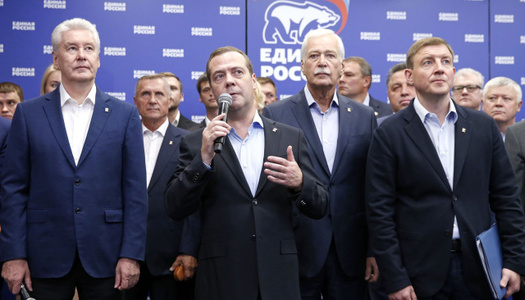
Did Russia’s ruling political party really lose Sunday’s regional elections? No, but there is one place it’s no longer in control.
Мы говорим как есть не только про политику. Скачайте приложение.
Did United Russia blow the September 9 elections?
It depends on how you look at it. Yes, United Russia failed to win 50 percent on party lists in 11 out of 16 races for regional legislative assemblies. But it lost in only three regions, narrowly and always to the Communists:
Irkutsk
- United Russia: 27.8 percent
- Russia’s Communist Party: 34 percent
Ulyanovsk
- United Russia: 33.9 percent
- Russia’s Communist Party: 36.2 percent
Khakassia
- United Russia: 25.5 percent
- Russia’s Communist Party: 31 percent
It’s important to evaluate these results in the context of the party’s past performance in these areas. From this perspective, United Russia’s failure is clear: in September 2013, the party won 42.3 percent in Irkutsk, 57.6 percent in Ulyanovsk, and 46.8 percent in Khakassia. It’s no coincidence that Andrey Turchak, the acting secretary of United Russia’s General Council, said after the elections that the party needs to make certain “personnel and organizational” decisions.
At the same time, United Russia won overwhelming majorities in five regions. For example, in Kalmykia the party took home 68 percent of the vote, and in Kemerovo it won 64 percent. In three regions, United Russia won about 40 percent, meaning that generally speaking, in at least half of Sunday’s races, the party performed relatively well.
Okay, but United Russia failed to grab a majority of the legislative assembly seats in 11 regions! Doesn’t this mean the local opposition can combine forces and mount a challenge?
No. Elections by party lists determine only half the seats on regional legislative assemblies in Russia. The other half of the seats go to the winners of single-mandate contests, where specific individuals (including independents) can stand for office. As a rule, United Russia gets the seats it needs for majorities on legislative assemblies because its members also win single-mandate races. For instance, the party won 28 percent of the party-list vote in the Zabaykalsky Krai (while LDPR and the Communists took 24 percent, each), but United Russia now controls 21 of the legislative assembly’s 50 seats, because its candidates won 13 single-mandate races.
It’s also important to remember that the opposition mounted by Russia’s “opposition parties” is fundamentally nominal. After the 2011 parliamentary elections, for example, United Russia lost its majority in the State Duma, and Communists and Just Russia deputies attended mass protests — but none of that stopped the parliament from passing draconian laws and earning a reputation as a “mad printer.” The situation is no better outside Moscow.
United Russia can win control over regional legislatures without even fielding its own candidates. In the Baltiysky District’s 2015 elections, for example, not one United Russia candidate won a single-mandate race, but it later turned out that many of the winners in fact “sympathize” with the party, effectively granting it a majority on the district council.
But United Russia lost to the Communists in three regions, so at least the party can’t dictate policy in those places?
In at least two of those three regions, United Russia is still in control — thanks again to seats won in single-mandate contests. In the Ulyanovsk region, United Russia candidates won 16 seats and the Communists took just 14. The remaining spots went to LDPR and the Communists of Russia Party (not to be confused with Russia’s Communist Party), which typically vote with United Russia. In Khakassia’s legislative assembly, United Russia will also have the biggest faction.
The only region in the whole country where Communists managed to win more seats than United Russia was in Irkutsk, where the Communist Party took 18 seats — one more than United Russia. For an extra advantage, the Communists have also formed a coalition with Civic Platform, which won three seats in single-mandate contests. In other words, this is the region to watch, as it will test the policy-making of Russia’s “political opposition.” One of the first initiatives the new ruling coalition has proposed, moreover, is the return of direct mayoral elections in Irkutsk.
Story by Andrey Pertsev of Kommersant, translation by Kevin Rothrock